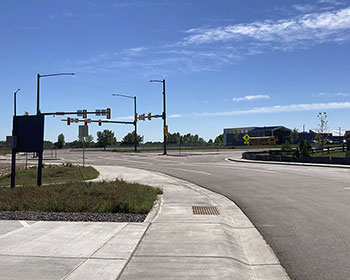New Traffic Signal Control Strategies May Improve Safety and Congestion During Disrupted Traffic at Intersections
Posted: Nov 13, 2023
 Researchers at Colorado State University are studying new traffic control strategies for signalized intersections that may improve traffic safety, reduce congestion, and cut wait times for motorists at intersections impacted by crashes and other traffic disruptions. The new adaptive traffic signal strategy, which integrates dynamic phase selection (DPS) technology and a queue length dissipation algorithm for disrupted scenarios with incidents at a single intersection, improves the resiliency of a typical intersection against disruptions caused by hazards or incidents. The DPS technique is used to skip unused phases during the incident period to avoid wasted time for drivers at the intersection. This approach may not only shorten the queue lengths at the impacted approaches, but also improve overall traffic performance at the intersection.
Researchers at Colorado State University are studying new traffic control strategies for signalized intersections that may improve traffic safety, reduce congestion, and cut wait times for motorists at intersections impacted by crashes and other traffic disruptions. The new adaptive traffic signal strategy, which integrates dynamic phase selection (DPS) technology and a queue length dissipation algorithm for disrupted scenarios with incidents at a single intersection, improves the resiliency of a typical intersection against disruptions caused by hazards or incidents. The DPS technique is used to skip unused phases during the incident period to avoid wasted time for drivers at the intersection. This approach may not only shorten the queue lengths at the impacted approaches, but also improve overall traffic performance at the intersection.
Suren Chen, Ph.D.
Colorado State University